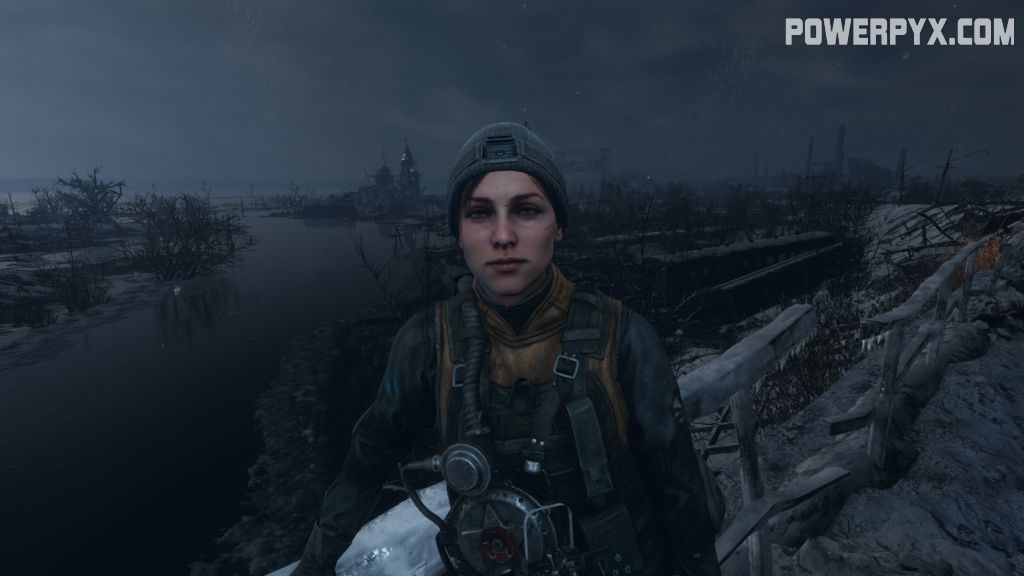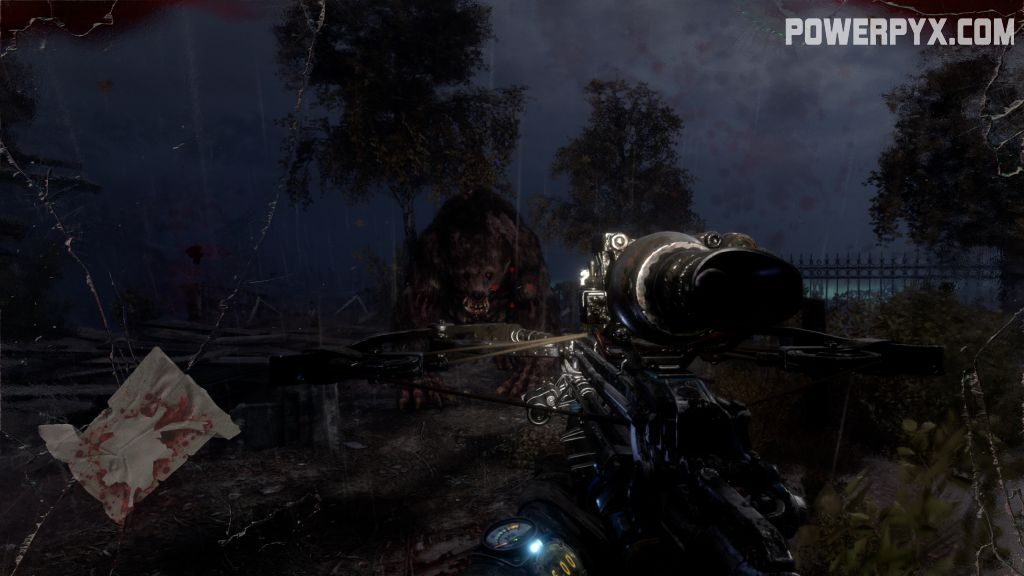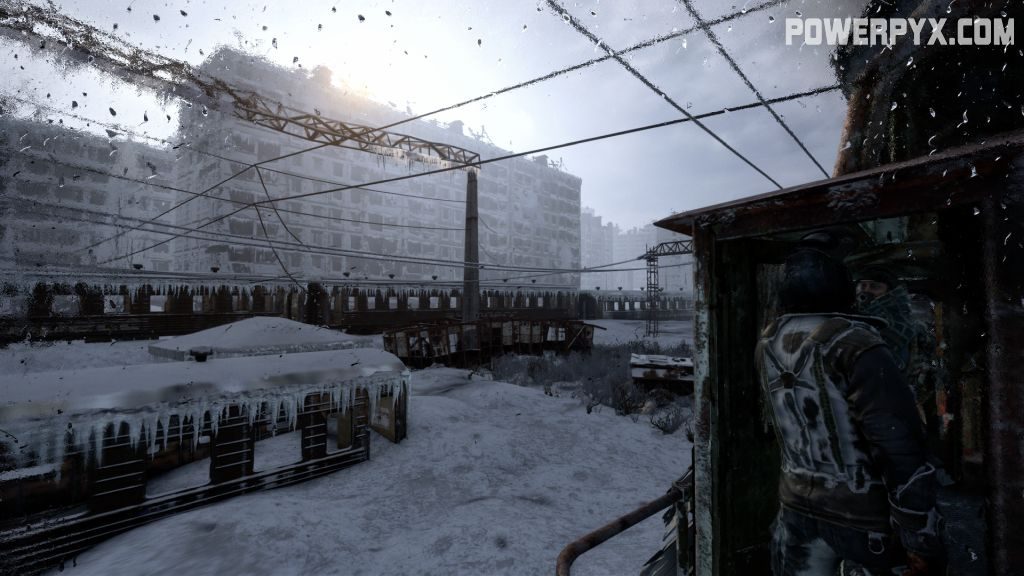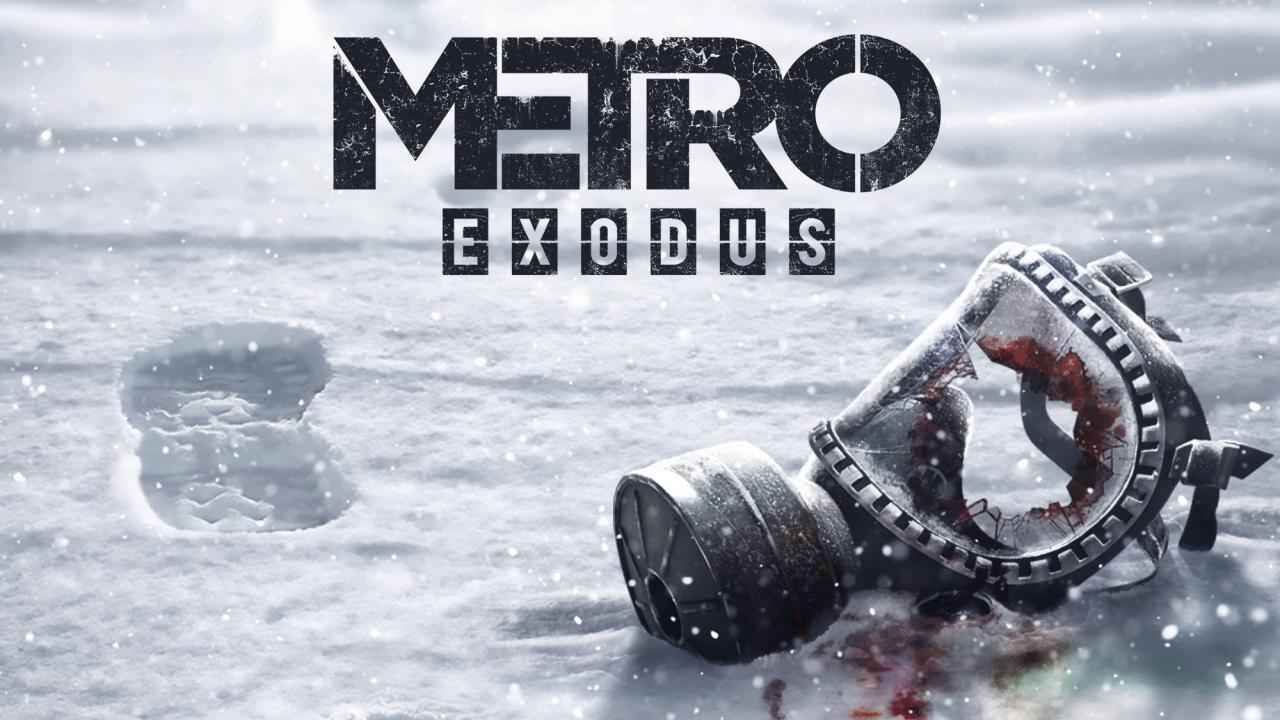Developer: 4A Games
Publisher: Deep Silver
Release Date: Feb 15, 2019
ESRB: Mature / PEGI 18
MSRP: $59,99
Available Platforms: PS4 [Reviewed], Xbox One, PC
Genre: First-person Shooter
It has been 22 years since nuclear war has rendered the surface of the world uninhabitable. The only survivors are those who were traveling on the Metro, or were able to reach its safety before the hermetic doors to the surface were sealed against the radiation. The entire population of the world within the tunnels and stations of the Metro numbers barely 50,000 people, living on mushrooms and the descendants of the few remaining livestock animals that they were able to save. It is a harsh, brutal life, where death comes easily and hope is only a distraction. These are the facts of life in the Metro — but what if everything you knew was a lie?
Metro Exodus is the third game in the Metro series (Metro 2033, Metro Last Light), once again following silent protagonist Artyom Dark through his trials and tribulations in the confines of the subway tunnels and stations of Moscow’s underground Metro. Unlike the somewhat upbeat Fallout series, Metro continuously hammers home the dangers of the post-apocalypse, where every trip to the irradiated surface comes with the threat of mutant attack and constant awareness of how few filters you have left for your gas mask. After the bleak tones of the first two games, Metro Exodus turns the series formula on its head, positing that perhaps life still may exist outside the Metro, and that Artyom’s continued attempts to make radio contact with the world have failed for a reason. It is with this new outlook that Artyom and a ragtag band set out to discover the truth, and perhaps find a way to save the last remnants of humanity from dying in the dark.

Like the previous games, Metro Exodus is based on the Metro book series written by Dmitry Glukhovsky, in this case very loosely based on the events of Metro 2035. Picking up after the events of Metro Last Light, our mute protagonist Artyom again finds himself in a position where it falls on his shoulders to save the world, but instead of the narrow tunnels of the Metro or the claustrophobic streets of Moscow’s destroyed buildings, Exodus takes us out of Moscow for the first time in the series and brings with it a completely new game structure. After the first few linear levels Exodus presents the player with huge, almost open-world scale maps that serve as a backdrop for multiple missions, side-quests, and a metric ton of random exploration to find crafting materials, suit upgrades, and weapon components scattered everywhere. Where Metro 2033 and Metro Last Light relied on scarce materials and sudden brutal encounters to evoke the tense atmosphere of the underground, Metro Exodus seems to revel in the additional space, bringing massive set pieces and large scale encounters to the table as a contrast. In fact, at times the new design and larger areas seemed more similar to 2007’s S.T.A.L.K.E.R.: Shadow of Chernobyl than a Metro title, which is in no way a bad thing, but a definite departure for the series.
The weapon customization system has been improved, allowing you to swap out the base weapons at your home base and customize them with a huge number of components to improve their performance, or tailor them to specific purposes like stealth or sniping. You can even carry two of the same base weapon and customize them entirely differently if you wished — though I always recommend against this, as they would use the same ammunition type. Best to mix and match, because that ammo goes quick in a tussle. You can use your backpack to immediately fit any parts you’ve picked up to the weapons you’re carrying, or use it at any time to make situational changes to your weapon components such as adding a night vision scope for dark areas, or a suppressor for places where stealth is preferred. If you take down any gun toting enemies you can swap out your weapon with theirs, or strip it for parts on the spot. Any components that you don’t have will be highlighted in orange, and any duplicates will be converted to parts or chemicals for crafting, ensuring that nothing picked up goes to waste. From your backpack you can craft special items like throwing knives or tin cans to be used as a distraction. You can even craft ammunition in the game! While you need a full crafting workbench to be able to do, this represents a welcome improvement for the series, and teaches the player early that scavenging will be your primary method of improvement rather than the bullet-based economy of the previous games.
Another major change that needs to be called out — as you progress through the game there are several areas where your gas mask will simply not be necessary to survive on the surface, blunting the impact of one of the most iconic mechanics of the Metro series. Some of my most visceral memories of the previous games revolve around constant risk/reward calculations while I madly searched corpses and blasted buildings for additional filters while my timer inexorably ticked down. Not only will that be a less frequent situation, but players will also be able to craft additional filters wherever they are using their backpack, as long as they have gathered enough material to do so. While some players will applaud the increased accessibility that this shift brings, and I’ll admit that it certainly is handy considering the new focus on exploration, but I can’t help but have mixed feelings about the changes in the greater context of the series.

One thing that hasn’t changed however, is the game’s look and feel. This is easily the most visually impressive Metro game, and stacks up against the year’s best open world or FPS games quite favorably. At no time do areas look as though they were cookie-cutter copy/paste affairs, but rather painstakingly hand-crafted and full of visual detail that sells the atmosphere of Exodus on an almost subconscious level. There is so much detail in every scene that it was easy to lose time just wandering through areas exploring and ignoring the main mission. Even the most outrageous mutations that threaten Artyom’s life are believable, having been given a visual upgrade to their design and animation to more closely resemble their unfortunate irradiated animal ancestry.
I also can’t express how much the sound design in every aspect of the game shines. From the simple act of putting down your backpack and unzipping it, complete with the rustle and gentle clinking of its harness sliding off, to the teeth rattling thrum of your Kalash firing, every audio cue reinforces the realism of this impossible world. Particularly in the oppressive dark of the Metro, where the tunnels do things to a man’s senses, the audio arguably sells the world more than any other aspect of the game. The steady drip of water, the echo of voices carrying through the tunnels, the muted scratching of clawed feet shuffling in the dirt… or is that just your imagination? On the desert hills of Caspian or the forests of the Taiga, distant animal calls warn of danger, and raise the hairs on the back of your neck. Even in the safety of camp, the sound design is top notch. Listening to half-heard snippets of conversations between the characters as you pass by, it always feels like a living world that continues to exist when you move out of earshot. Even if you pause to eavesdrop on these exchanges, they go on for minutes at a time and bring new insights to the characters and their place in the world, far beyond what I would expect from a typical NPC conversation that doesn’t even happen during a cut-scene.
At the beginning of each level, or when loading after a death there is a load screen, but otherwise the world is seamless. That said, some of the load times can be excessively long, particularly on those ‘open-world’ levels which are significantly larger than the rest. Players can create a quick save for manual saving or they can use the auto save function, but there is no function for making multiple manual saves so be wary of quick saving yourself into a situation and not being able to fight (or save scum) your way out of it. I found myself stuck in the Oasis near the end of the Caspian level, and spent hours trying to get out of that box canyon before I gave up and re-started the chapter. Yes, at least you will have chapter select, which could have been more conveniently implemented for the larger levels (like Caspian), but will still be a boon for trophy hunters looking for collectibles. Another weird technical issue to mention is that I found that the sensitivity of the camera might feel a little slow to some. I basically had to turn it up to the max in order to be comfortable with it.

I’ve done my best to avoid any direct story spoilers that aren’t on the outside of the box, and even those who have already read Metro 2035 as I have will find more than enough is different to be pleasantly surprised by some of the twists and turns the plot takes. While Exodus probably won’t win any awards for its story, it’s a decent game script with well written characters that are highly developed by the end of the game. Artyom’s ragtag band starts to feel like a real family by the end of the game. There are even some significant events that the player can affect, and as with previous Metro games, a good and a bad ending that can be influenced based on its hidden morality system that doesn’t overtly give you the formula to achieve one or the other. This is something I’m grateful for not having been touched, since it rewards considering your actions carefully before you take them without a clear ‘Paragon/Renegade’ path highlighted for your safety.
The Metro series has long held a special place in my heart, as the setting and world combine the familiar setting of the subway / metro / underground with the utterly unfamiliar day-to-day existence after twenty years of habitation. While Metro Exodus has departed somewhat from this formula, most of its changes were positive. Granted, while they definitely make the game more accessible to a new player, one might argue that the restrictions were part of the identity of the Metro games and by removing some of its teeth we take away from its core attraction. Overall, I feel that the changes have added more than they’ve taken away, and for those who prefer a challenge, there is still Ranger Hardcore difficulty to more than pick up the slack. All in all, Metro Exodus might reinvigorate interest in the series. The (good) ending of Metro Exodus definitely leaves the door open for possible sequels, potentially bringing in some of the additional elements of Metro 2035 that have not yet been referenced. Also, there are three DLC packs coming in the future as well, so there’s plenty here to be enthusiastic about. Once again 4A Games have delivered a fantastic vision of a horrible world, this time leaving our favorite characters a little hope for tomorrow.
| Gameplay *Overall Enjoyment Factor, Fascination with Game World, Level Design, Variety, Playability, User-Friendliness (Ease of Use / Readability / Controls / in-game Tutorials / Menus) |
| 8/10 As always, Metro games are fun first-person romps through mutants and bad guys, this time throwing in a day/night cycle and the occasional opportunity to drive some vehicles as icing on the cake. It’s still a little unusual about the camera sensitivity however, and getting stuck in the Oasis. Hopefully these issues can be addressed with a patch. Also, it has supremely satisfying throwing knives, which all good games must have. |
| Story/Multiplayer *Quality of the Singleplayer Story, Cutscenes and/or Multiplayer Modes (whichever is available). If a game has no Story or no Multiplayer it won’t be rated (thus no negative effect on score). |
| 9/10 The overall story arc takes the Metro franchise in an entirely new direction, but stays true to its roots with interesting character vignettes throughout the story that inform the player about his companions on his journey. |
| Technical Aspects *Graphics, Texture Quality, Character Details, Lighting, Weather Effects, Animations, Loading Times, Number of Loading Screens, does it run smoothly |
| 10/10 Graphics, lighting, and particularly sound design all lend incredible realism to a horrifically unreal situation. While the loading can take an excessive amount of time, it will only load once per level. I can forgive that inconvenience in light of the amazing sound design of this game. |
| Value *Amount of Content, Production Quality, Replay Value, is there enough content to justify a purchase |
| 8/10 This measurement might be somewhat subjective, so know what you’re getting into. It is a story based FPS with no multiplayer. It is definitely a game that I will replay in future, and it is definitely of a sufficient length that I more than felt I got my money’s worth. |
| Trophies/Achievements *Rates how much fun the Platinum / 1000 Gamerscore is to achieve: Are trophies fun to do? Do trophies restrict freedom of gameplay? Missable trophies? Multiple playthroughs required? Luck-based trophies? Pointless farming/grinding? Glitched Trophies? Are stats/trophies tracked correctly? |
| 9/10 There are some missable trophies, particularly related to collectibles and some of the ‘must survive’ trophies, however the game does offer chapter select and any kill count trophies (like Antibiotic) carry over through chapter select as well. |
| Extraordinary Score Increase or Deduction *Reserved for extraordinarily good or bad features that the other categories don’t cover (such as game-breaking bugs). This score is directly added/subtracted from the final score. |
| As I mentioned, I did get stuck in the Oasis and was not able to escape. I won’t deduct any points for it since I’m sure it will be patched out, but you can bet I swore for three hours trying to jump an invisible wall. |
VERDICT:
A fantastic addition to the Metro series that manages to be more accessible to new users, while still remaining challenging for fans.
FINAL SCORE:
8.8/10
Played on PS4 Pro. Reviewed by staff writer Jack. A Review copy was provided for free by the publisher. Earned the platinum trophy, found all collectibles.
For more on how reviews are scored, check out the Review Policy.

